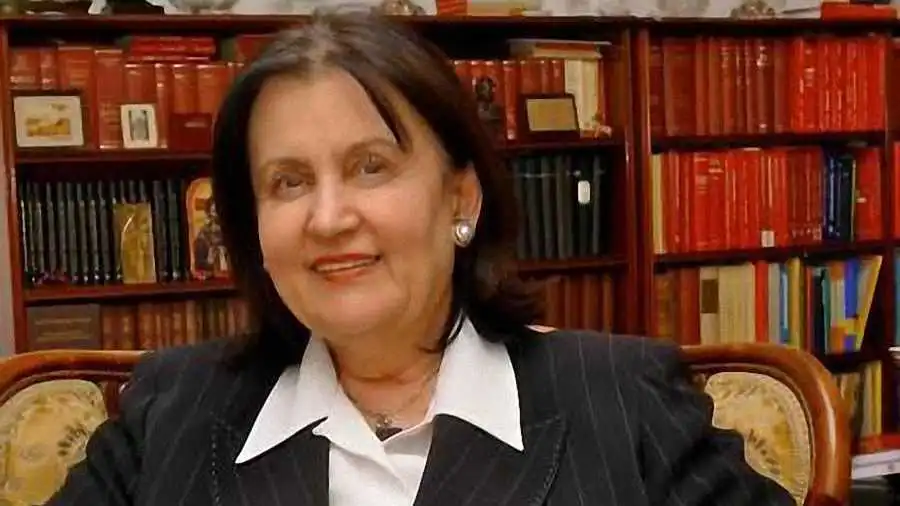International lawyer Eva Maria Barki's presentation at an Austrian event on the legal background of the Russian-Ukrainian war. The speech given is published with the note that the article does not necessarily reflect the opinion of the editors.
1. Since February 24, 2022, Russia has been accused of invading the sovereign state of Ukraine and thus of aggression in violation of international law. Vladimir Putin himself is accused of international crimes, and even the United States, which does not recognize the International Criminal Court, believes the case should be brought before the International Criminal Court in The Hague.
2. The accusations have no factual and legal basis. They should be seen as part of the war against Russia, which the USA planned as early as 1991 and defined in the "National Security Strategy of 2002" in order to eliminate Russia, which is considered a rival, and preserve the monopoly of power of the USA. Zbigniew Brzezinski , a geopolitical consultant, called Ukraine an important square of the Eurasian chessboard and a political checkmate. The war in Ukraine is actually a war of the USA against Russia.
3. Not Russia, but, on the contrary, the Ukrainian government should be accused of violations of law, in particular violations of international law, namely:
• Violation of the rights of ethnic groups and national minorities
• Violation of the two Minsk agreements
• Violation of the right of peoples to self-determination
• Violation of the Budapest Memorandum (December 5, 1994)
4. Ukraine is not a homogeneous, historically developed nation-state. Throughout history, its territories have belonged to other states several times, for example Subcarpathia, the western part of Ukraine was part of the Kingdom of Hungary and the Habsburg Monarchy until the First World War, and was mostly inhabited by Ruthenians and Hungarians, as well as other ethnic groups, such as Poles, Belarusians, Romanians and Bulgarians, but primarily the at least 6 million Russians in the eastern part of Ukraine. In Ukraine, more than half of the population does not speak Ukrainian.
5. Since Ukraine consists of territorial parts and populations with different historical, cultural and national identities, a federal form of government is necessary, and the rights of different ethnic groups and nationalities must be taken into account. When in 1991, with the dissolution of the Soviet Union, the question of the independence of Ukraine, which had been under the influence of the Soviet Republic until then, became relevant, George W. Bush , in his speech to the Ukrainian parliament on August 1, 1991, warned the representatives not to vote for independence, but stay with Russia, because otherwise a "suicidal war of nationalities" will take place. He was right.
6. The starting point and cause of the current crisis were the bloody events on Majdan Square in 2014, which ended with a coup and the installation of a Western-oriented and Western-backed government. In response to this and due to the fear of similar aggression, referendums were held in the Donbass - in the Luhansk and Donetsk regions - but also in Crimea, which aimed to approve state autonomy.
As a result of the referendum, Luhansk and Donetsk declared themselves independent. (90% voted for independence, 75% turnout in Donetsk and over 80% in Luhansk)
The response of the (illegitimate) government in Kyiv has been the deployment of military and US mercenary forces, heavy artillery rocket attacks, bombings, phosphorus bombs, cluster bombs, destruction of homes, schools, hospitals, and infrastructure, cutting off electricity, and denying aid, which is more than It claimed 5,000 victims, mostly civilians, and resulted in millions of refugees and an indescribable social emergency.
7. Subsequently, in September 2014, in the first Minsk agreement, they agreed on a ceasefire and steps towards the implementation of the peace plan for Donbass, according to which the two republics were legally recognized.
The agreement was violated by the Ukrainian government and fighting continued.
8. In the second Minsk Agreement of February 12, 2015, they agreed on the implementation of the first Minsk Agreement with the aim of resolving the conflict as follows:
• constitutional reform in Ukraine and decentralization of the Donetsk and Luhansk regions are implemented
• a law on the special status of Donetsk and Luhansk is adopted
• regional elections are held in these areas of local governments
Arseniy Yatsenyuk already indicated a day later that they will not comply with the second Minsk agreement, and they are not willing to give up their demands on Donetsk and Luhansk.
9. The Minsk Agreement is a binding treaty under international law, which is also confirmed by UN Security Council Resolution No. 2202, and is thus binding on all states under international law.
The Kyiv government did not respect the Minsk agreements, not only did it break the ceasefire, but it also failed to carry out the constitutional reform and the creation of the autonomous status of Luhansk and Donetsk. Thus, it is not only a breach of contract, but the military aggression against the Donbass, which violates this contract, is undoubtedly a war crime.
10. In particular, the people's right to self-determination, the most fundamental law of international law, was violated. The right of peoples to self-determination, as a fundamental right of every democratic and just international order, has always been considered a natural right. As a universal right, it is a prerequisite for all other rights, both for the individual and for all communities. Without self-determination there is no political freedom, without freedom there is no democracy and there is no just international order. But above all, there is no peace without a just international order. The root cause of all local conflicts lies in the denial of self-determination. Therefore, peace is the right of peoples to self-determination, as well as the most important prerequisite for the peaceful coexistence of peoples and nations.
The right of peoples to self-determination as a political postulate was first introduced by President Woodrow Wilson However, due to the neglect of self-determination, these did not bring peace, but created the foundations of new, still unresolved and already erupted conflicts (see Middle East).
During the Second World War, President Franklin Roosevelt Winston Churchill laid down the basic principles of the future peace order in the Atlantic Charter of 1941, the most important goal of which was the self-determination of peoples. These are just empty words. In Yalta, another language already prevailed. Just as after the First World War, the peoples of Central Europe were also deprived of the right to self-determination and half of the continent was placed under foreign rule.
As a result, the right of peoples to self-determination, enshrined in Articles 1 and 55 of the United Nations Charter as the goal and basis of peaceful relations between nations, was treated as a political concept for colonial peoples. However, it was not needed in Europe.
Since the two human rights treaties of the UN of December 16, 1966, the International Covenant on Civil and Political Rights and the International Covenant on Economic, Social and Cultural Rights, the right to self-determination is not only a political objective, it is not only included as a principle in the UN Charter, but as a fundamental right.
The law of the people and the legal effect connecting the contracting state
In both human rights treaties, which contain individual human rights, the collective right of peoples is included in Article 1 as the basis of human rights. Article 1 of the two treaties states the same thing: " All peoples have the right to self-determination. By virtue of this right, they can freely decide on their political status and freely shape their economic, social and cultural development."
Accordingly, the United Nations Human Rights Commission, which is responsible for monitoring the International Covenant on Civil and Political Rights, states that the right to self-determination is a fundamental prerequisite for the exercise of all human rights. Many scholars therefore believe that the right to self-determination is to be understood as an individual human right that goes beyond the collective right of the people.
The right of self-determination is binding (ius cogens)
It is unanimously accepted that the right of peoples to self-determination is binding - ius cogens. This means that this legislation cannot be deviated from under any circumstances, even on the basis of a contract.
According to Article 53 of the Vienna Convention on the Law of Contracts (WVK), contracts that conflict with mandatory law are considered invalid.
The importance of a mandatory law in international law is also proven by the fact that it can even be effective retroactively. (ius cogens superveniens). According to Article 64 of the Vienna Convention on the Law of Treaties, any contract is invalid and void if a binding international law subsequently enters into force. According to this, such a treaty is void regardless of the will of the parties. According to Article 71 of the Vienna Convention on the Law of Contracts, the termination of the contract has the consequence that the parties are released from the obligation of further performance of the contract, and the legal situation created by the contract can only be maintained if it does not conflict with the mandatory law.
For Crimea, this means that Khrushchev's donation to Ukraine in 1954, which undoubtedly violated the right to self-determination, became invalid with the entry into force of the above-mentioned Article 1 of the UN Convention on Human Rights, and its belonging to Ukraine cannot be maintained for this reason either. So Putin was right when he referred to the restoration of the justice system.
Just to be clear: In international law, apart from violations of basic human rights, there are only three laws that are binding: the right of peoples to self-determination, the prohibition of violence, and the prohibition of genocide. Violations of territorial integrity or state sovereignty are not among them.
United Nations General Assembly Resolution 2625 (XXV) of 24 October 1970 - "Declaration of Friendly Relations"
In addition to the Universal Declaration of Human Rights, the declaration of principles of the United Nations General Assembly of October 24, 1970, the Declaration of Friendly Relations, which was adopted by consensus - i.e. without a dissenting vote - is undoubtedly the most important declaration of the UN General Assembly. Although not officially legally binding, the declaration contains, as the concluding remarks show, a reproduction of the applicable customary international law.
This declaration expressly recognizes the right to secede, either through the creation of a separate sovereign state, or through free association with or absorption into another state.
The declaration contains not only the right of peoples to freely determine their political status, but also that if they encounter resistance in their efforts to exercise the right of self-determination, they have the right to request and accept support in order to exercise the right of self-determination.
In addition, the declaration includes the obligation of all states to refrain from any violent action that deprives a people of the right to self-determination, and lays down the express duty of all states to support the realization of self-determination.
External self-determination can only be limited if a state guarantees internal self-determination, i.e. it represents the entire population while preserving internal self-determination.
Based on the Declaration of Friendly Relations, Crimea had the right to secede and ask for help from Russia, and Russia had the duty to provide help.
11. State sovereignty and territorial integrity
The basic principles of state sovereignty and territorial integrity are used as arguments against secession and to justify annexation.
Above all, it is striking that respect for state sovereignty is particularly invoked by those who otherwise consider state sovereignty to be obsolete and advocate the dissolution of the nation-state.
State sovereignty includes the right to establish the constitutional and legal order independent of the influence of external powers. It refers to the relationship of states or subjects of international law to each other, not to the rights of a people vis-à-vis the state. Even if there is a contradiction between the people's right to self-determination and the state's claim to sovereignty, the right to self-determination definitely takes precedence. State sovereignty is limited in international law. There is no international treaty or domestic constitution that prohibits the right to self-determination (see ius cogens).
The protection of territorial integrity is contained in Article 2(4) of the United Nations Charter, and it also applies only to relations between states, not to peoples. It obliges states, not peoples, to refrain from violating the territorial integrity and independence of a state. from the use of violence or threats.
December 1987 of the UN General Assembly. According to Resolution No. 7 A/RES/42/259, which specifically refers to the Declaration of Friendly Relations, peoples have the right to struggle for self-determination, during which violence is also justified (point 14 of the resolution).
1975 Helsinki Final Act
The illegality of Crimea's secession is often justified by referring to the Helsinki Final Act of 1975 and the principles of the inviolability of borders (III) and the territorial integrity of states (IV) contained therein. This follows from the principle of sovereignty in point I and applies to participating states, which must mutually respect their rights based on sovereignty, and therefore does not apply to peoples.
What they completely ignore and gloss over is the fact that the Helsinki Final Act VIII. also includes the right of collective self-determination of the peoples and, in addition, the equality of the peoples. Article 1 of the Human Rights Conventions is further expanded and enhanced by emphasizing that peoples can exercise this right whenever and however they want. In addition to defining political status, the economic, social and cultural development mentioned in the human rights treaties also it can be seen as a distinctly political development that must be pursued according to each nation's own vision.
They also ignore and skim over the warning contained in the Helsinki Final Documents, which reminds us of the importance of the equality of peoples and the effective exercise of the right to self-determination, as well as the importance of exclusion in case of any form of violation of this principle.
The Helsinki Final Act undoubtedly contributed to the fact that, 15 years later, people's power started the wave of self-determination in many countries, which overthrew a dictatorial regime and brought independence and freedom to many peoples.
12. The 1994 Budapest Memorandum
The other - currently only attempted - violation of the law is the government's announced intention not to fulfill the elimination of nuclear weapons contained in the 1994 Budapest Memorandum and, if necessary, to start the production of nuclear weapons.
13. The first and most important war goal formulated by President Putin, namely the protection of the Russian population, is therefore justified, and this is also confirmed by the continuous military attacks against Donbass.
14. Demilitarization and denazification of Ukraine
President Putin subsequently identified the demilitarization and denazification of Ukraine beyond the Donbass as an additional war objective, and to this end he conducted operations outside the Donbass.
To answer the question of whether these undoubtedly acts of war are justified, the latest doctrine of international law relating to wars of aggression must be taken as a basis.
Although military action is permitted only under a United Nations mandate, the permissibility of war for peacekeeping and humanitarian interventions has been debated in recent years.
According to the new doctrine of international law, "preemptive war of aggression" is permissible even when fundamental interests and security are threatened. A pre-emptive military strike is also justified in order to ward off possible and threatening attacks.
15. Russia is undoubtedly in a situation where both its security and integrity are at risk. Russia is completely encircled by NATO, NATO troops are stationed in close proximity to Russian borders, missile defense facilities in Romania and Poland pose a direct nuclear threat, as do the build-up of European nuclear arsenals and the West's continued and serious threats with nuclear weapons. Furthermore, many biolaboratories established near the Russian border are rightly considered a threat by Russia. The picture is completed by the ever-increasing economic sanctions against Russia and information warfare containing incorrect claims.
The aim of demilitarizing Ukraine seems permissible from this point of view, where denazification is supposed to refer to the Ukrainian far-right forces that already caused the massacres of 50,000 Russians and Jews in the Second World War, and which are currently the driving force behind the war against Donbass.
16. In summary, it can be said:
It is not Russia that violates international law, but, on the contrary, the Kyiv government, which is supported by the West - especially with financial means and weapons - and which is fed by the Western media.
17. Rule-based order instead of international law
The war in Ukraine is another example of how international law no longer applies.
In the West, they are not at all opposed to ignoring and abolishing the former international law. We do not refer to international law, but to the "rule-based order", which the West dictates and tries to enforce by all means. Power comes first.
In order to restore international law, an international debate and initiative would be necessary.
Author: Eva Maria Barki, international lawyer
(Header image: Facebook/NIF)
We note again: the opinion of the author does not necessarily coincide with the opinion of the editors.













